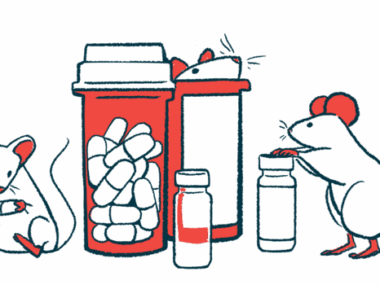Benefits of repurposed monepantel for ALS sustained for up to 2 years
Vet drug continues to slow disease progression, extend survival: Interim results
Written by |

Monepantel, a veterinary drug that PharmAust is repurposing for amyotrophic lateral sclerosis (ALS), continues to slow disease progression and extend survival when taken daily for up to nearly two years, while being generally well tolerated by patients.
That’s according to interim results from an open-label extension study (NCT06177431) that’s testing how safe monepantel is and how well it works in adults with ALS who continued to receive the treatment after completing a dose-finding Phase 1 clinical study called MEND (NCT04894240).
“These results are extremely encouraging and [continue] to emphasise the excellent long-term safety profile and potential of [monepantel] to increase the life expectancy of this very vulnerable patient population,” Michael Thurn, PhD, PharmAust’s managing director and CEO, said in a company press release.
Some patients have been on monepantel for up to 23 months, or nearly two years, with ongoing results coming from the 10 mg/kg daily dose. Based on the promising findings, monepantel has been selected to be studied at that dose in an upcoming Phase 2/3 study within the HEALEY ALS Platform Trial, which is testing multiple ALS candidate treatments at the same time to shorten development timelines.
Enrollment in monepantel’s arm of HEALEY expected to start later this year
Enrollment into monepantel’s arm of HEALEY is expected to start later this year. If positive, results could lead to accelerated approval of monepantel in 2026, according to the company.
“The results also provide us with confidence on dose selection for the HEALEY ALS Platform Trial,” Thurn said. “We’re very excited about the path ahead and the potential to help more patients.”
Monepantel is a deworming agent widely used in veterinary medicine. However, it has been found to have an off-target effect wherein it inhibits the mTOR signaling pathway, which is involved in how cells grow in number and survive. Inhibiting mTOR signaling can also prime cells to break down unneeded proteins, a recycling mechanism that’s generally faulty in people with ALS, causing incorrectly folded proteins to build up in nerve cells.
Because monepantel has the potential to reduce abnormal protein buildup, PharmAust believes the medication may be repurposed to slow ALS progression.
To assess that, the company initially launched the MEND study, which included 12 adults with ALS who received daily treatment with monepantel oral tablets. Six patients received the medication at a low dose of 2 mg/kg and 6 mg/kg, while the other six were given a high dose, of 4 mg/kg and 10 mg/kg. Dose escalations could be offered every 28 days, based on recommendations from a safety management committee.
Patients on high-dose monepantel saw slower disease progression
Top-line data showed patients who received monepantel at the high dose saw their disease progression slow by as much as 58% compared with matched untreated patients from the PRO-ACT historical database, which includes thousands of people who participated in ALS clinical trials and observational studies.
After completing MEND, all patients continued to receive monepantel via a compassionate use program, a special access scheme that allows the use of a yet-unapproved treatment. They were then given the option to join an open-label extension, running at two sites in Australia, and receive the treatment at the 10 mg/kg dose for an additional one year.
Ten of the 12 patients who completed the MEND study joined the open-label extension. Of the two who didn’t enroll, one died due to disease progression while on the compassionate use program, and the other couldn’t join because of elevated liver enzymes. A third patient joined the extension study but died of pneumonia.
Four months into the open-label extension, patients experienced a 43.2% slower rate of functional decline compared with PRO-ACT matched controls, as measured using the ALS Functional Rating Scale-Revised, where lower scores indicate worse ability to perform daily tasks.
Importantly, five (56%) patients didn’t experience any functional decline over the extension’s first four months.
Patients treated with monepantel had 80% lower risk of death
Patients treated with monepantel also experienced significantly longer survival, with an 80.3% reduced risk of death compared with untreated patients from the historical database.
PharmAust discussed the development pathway for monepantel with the U.S. Food and Drug Administration (FDA) earlier this year. A few months later, the FDA granted monepantel orphan drug designation for ALS, a status that comes with incentives to encourage treatment development for rare diseases.
“In October, we will reach the 2-year anniversary since the first patients started treatment with [monepantel],” Thurn said. “We have made incredible progress over this period, including engaging with the US Food and Drug Administration regarding the development pathway for [monepantel] …, being granted Orphan Drug Designation from the US FDA and more recently, monepantel being selected for inclusion in the prestigious HEALEY ALS Platform Trial.”








